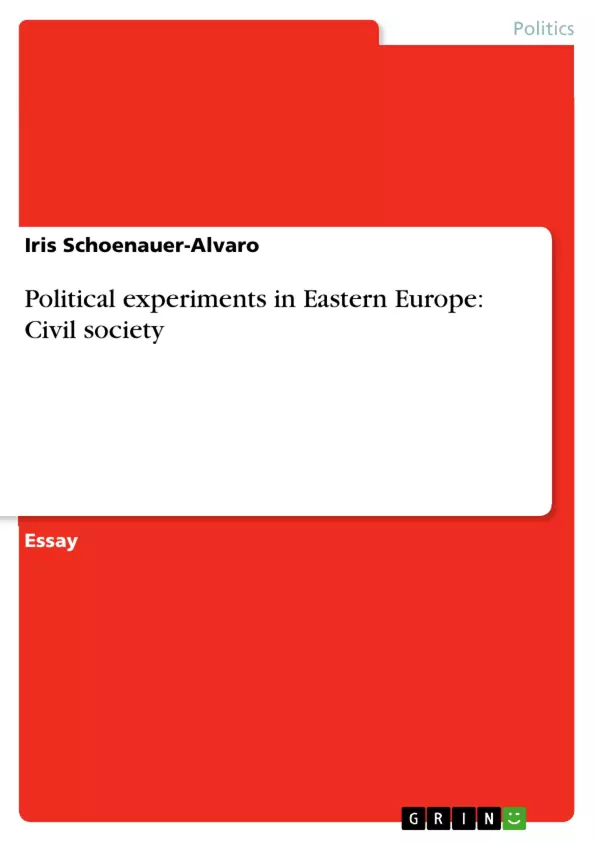Despite the fact that during the recent Hungarian plebiscite regarding the country's accession to the European Union (EU) 83.76 per cent of the votes were in favour of joining the EU, the low election turnout of only 44.13 per cent of all Hungarians entitled to vote was considered "shameful"; an important political and economic decision has been taken with the official approval of only two fifth of the eight million Hungarians with voting rights.1 This and other somewhat disappointing examples raise the question of how committed Eastern Europeans are in terms of forging their own post-communist future. This paper will attempt to analyse the role civil society has played in the democratisation process of the region since 1989. As effects can generally only be properly assessed with a mid- or even long-term perspective, looking at isolated events, which took place during the last slightly more than thirteen years, does not suffice to come to a reliable conclusion about the strength or weakness of civil society. For this reason, I will focus in my analysis on tendencies and their possible historical explanation; where possible, survey data will be provided which should facilitate a broader understanding of current trends. Since - due to the individual countries’ very distinct historical characteristics - in many instances it does not seem appropriate to evaluate "Eastern European civil societies" as a whole, I will adopt Attila Ágh’s model differentiating at times between "East Central European (ECE) civil society" (Poland, Czech Republic, Slovakia, Hungary, Slovenia, Croatia) and "the Balkans civil society" (Bulgaria, Romania, Serbia, Macedonia, Albania, Bosnia) taking into consideration regional similarities (Ágh, 1998: 5). The structure of this paper will be as follows: Firstly, I will look at the concepts of civil society in general, post-communist civil society in particular as well as democratisation in Eastern Europe. This will be followed by an examination of two areas, which tend to be closely associated with civil society: the strength of civic associations in terms of density and intensity as well as the relationship between civic associations and political institutions; the second area includes an evaluation of the concept of trust. Lastly, I will offer a general judgement as to whether I think that the civil society of the region can rightly be considered "the great disappointment of post-communist democratisation".
Inhaltsverzeichnis (Table of Contents)
- Civil Society, Post-communist Civil Society, and Democratisation
- Civil Society in General
- Post-communist Civil Society
- Democratisation in Eastern Europe
- The Strength of Civic Associations and the Relationship Between Civic Associations and Political Institutions
- The Concept of Trust
- Conclusion
Zielsetzung und Themenschwerpunkte (Objectives and Key Themes)
This paper aims to analyze the role civil society has played in the democratization process of Eastern Europe since 1989. It examines the extent to which civil society has been a disappointment in this process, considering the legacy of communism and the challenges faced by post-communist societies. Key themes include:- The concept and characteristics of civil society in post-communist Eastern Europe
- The impact of communist legacies on civil society development
- The role of civic associations in promoting democratic values and institutions
- The relationship between civil society and political institutions in Eastern Europe
- The concept of trust and its importance in democratic consolidation
Zusammenfassung der Kapitel (Chapter Summaries)
The first chapter of this paper explores the concepts of civil society, post-communist civil society, and democratization in Eastern Europe. It examines the various definitions of civil society, highlighting the challenges of understanding its role in post-communist contexts. The chapter also discusses the impact of communist legacies on the development of civil society, particularly in terms of democratic culture and citizen participation. The second chapter focuses on the strength of civic associations in Eastern Europe and their relationship with political institutions. It analyzes the density and intensity of civic associations, exploring factors that influence their development and effectiveness. The chapter also examines the role of civic associations in promoting political participation and holding government accountable. The third chapter delves into the concept of trust in post-communist societies. It examines how trust has been affected by the communist past and the challenges of building trust in newly democratic systems. The chapter explores the role of social capital, civic engagement, and public opinion in fostering trust and its impact on democratic consolidation.Schlüsselwörter (Keywords)
The paper focuses on key concepts and terms such as civil society, post-communist civil society, democratization, civic associations, political institutions, trust, democratic culture, citizen participation, and the legacy of communism in Eastern Europe.Frequently Asked Questions
What role did civil society play in Eastern Europe after 1989?
The paper analyzes how civil society influenced the democratization process, examining whether it met expectations or became a "great disappointment" in the post-communist era.
How does the author differentiate between regions in Eastern Europe?
The author uses Attila Ágh’s model to distinguish between "East Central European (ECE) civil society" (e.g., Poland, Hungary) and "Balkans civil society" (e.g., Bulgaria, Romania).
What impact did the communist legacy have on citizen participation?
The legacy of communism created specific challenges for developing a democratic culture and high levels of citizen engagement in civic associations.
Why is the concept of "trust" important in this context?
Trust is a key component of social capital; the paper evaluates how low levels of trust in post-communist societies affect democratic consolidation.
What was noted about the 2003 Hungarian EU accession plebiscite?
Despite a high percentage of "yes" votes, the low turnout of only 44.13% raised questions about the level of political commitment in the region.
What is the focus regarding civic associations?
The study examines the strength of these associations in terms of density and intensity, as well as their relationship with political institutions.
- Quote paper
- Iris Schoenauer-Alvaro (Author), 2003, Political experiments in Eastern Europe: Civil society, Munich, GRIN Verlag, https://www.grin.com/document/112834



